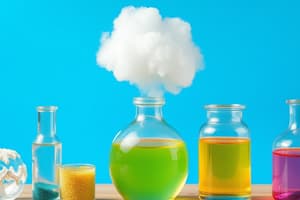Podcast
Questions and Answers
What is matter?
What is matter?
- A type of energy
- A chemical reaction
- A process of change
- Anything that has mass and takes up space (correct)
What is chemistry?
What is chemistry?
Study of the composition of matter and the changes that matter undergoes.
What are the 5 traditional areas in chemistry?
What are the 5 traditional areas in chemistry?
Organic, inorganic, biochemistry, analytical, and physical chemistry.
What is organic chemistry?
What is organic chemistry?
What is inorganic chemistry?
What is inorganic chemistry?
What is biochemistry?
What is biochemistry?
What is analytical chemistry?
What is analytical chemistry?
What is physical chemistry?
What is physical chemistry?
What is pure chemistry?
What is pure chemistry?
What is applied chemistry?
What is applied chemistry?
What are three general reasons to study chemistry?
What are three general reasons to study chemistry?
What is technology in the context of chemistry?
What is technology in the context of chemistry?
What are some outcomes of modern research in chemistry?
What are some outcomes of modern research in chemistry?
How did Lavoisier help to transform chemistry?
How did Lavoisier help to transform chemistry?
What are the steps in the scientific method?
What are the steps in the scientific method?
What is the scientific method?
What is the scientific method?
What is observation?
What is observation?
What is a hypothesis?
What is a hypothesis?
What is an experiment?
What is an experiment?
What is an independent variable?
What is an independent variable?
What is a dependent variable?
What is a dependent variable?
What is a model?
What is a model?
What is a theory?
What is a theory?
What is a scientific law?
What is a scientific law?
What role do collaboration and communication play in science?
What role do collaboration and communication play in science?
Flashcards
Matter
Matter
Anything that has mass and takes up space.
Chemistry
Chemistry
The study of matter and its transformations.
Organic Chemistry
Organic Chemistry
The study of carbon-containing compounds.
Inorganic Chemistry
Inorganic Chemistry
Signup and view all the flashcards
Biochemistry
Biochemistry
Signup and view all the flashcards
Analytical Chemistry
Analytical Chemistry
Signup and view all the flashcards
Physical Chemistry
Physical Chemistry
Signup and view all the flashcards
Pure Chemistry
Pure Chemistry
Signup and view all the flashcards
Applied Chemistry
Applied Chemistry
Signup and view all the flashcards
Scientific Method
Scientific Method
Signup and view all the flashcards
Observation
Observation
Signup and view all the flashcards
Hypothesis
Hypothesis
Signup and view all the flashcards
Experiment
Experiment
Signup and view all the flashcards
Independent Variable
Independent Variable
Signup and view all the flashcards
Dependent Variable
Dependent Variable
Signup and view all the flashcards
Scientific Law
Scientific Law
Signup and view all the flashcards
Antoine Lavoisier
Antoine Lavoisier
Signup and view all the flashcards
Theory
Theory
Signup and view all the flashcards
Model
Model
Signup and view all the flashcards
Study Notes
Introduction to Chemistry
- Matter: Any substance with mass that occupies space.
- Chemistry: The scientific study focused on the composition of matter and its transformations.
Areas of Chemistry
- Five Traditional Areas:
- Organic Chemistry: Focuses on carbon-containing compounds.
- Inorganic Chemistry: Studies compounds that do not contain carbon.
- Biochemistry: Examines chemical processes in living organisms.
- Analytical Chemistry: Analyzes the composition and properties of substances.
- Physical Chemistry: Investigates the physical principles underlying chemical systems.
Types of Chemistry
- Pure Chemistry: Involves seeking knowledge for its own merit without a specific application in mind.
- Applied Chemistry: Research aimed at practical applications or solutions to real-world problems.
Importance of Studying Chemistry
- Explains natural phenomena and processes.
- Prepares individuals for various career paths in science and technology.
- Cultivates informed citizenship by enhancing understanding of scientific issues.
Role of Technology in Society
- Technology is employed to fulfill societal needs for goods and services.
Contributions of Modern Chemistry Research
- Aims to develop technologies to:
- Benefit the environment.
- Conserve and produce energy.
- Enhance human health and quality of life.
- Broaden our understanding of the universe.
Historical Influence on Chemistry
- Antoine Lavoisier: Transformed chemistry by introducing measurement techniques, moving it from descriptive to quantitative analysis.
Scientific Methodology
- Steps in the Scientific Method:
- Observe: Gather information through sensory experience.
- Hypothesize: Formulate an explanation based on observations.
- Experiment: Conduct tests to validate or invalidate the hypothesis.
- Conclude: Analyze the data and derive conclusions.
- Develop Theory: Formulate a well-supported explanation based on repeated testing.
Components of Scientific Research
- Observation: Understanding phenomena through sensory data.
- Hypothesis: A testable prediction explaining observed facts.
- Experiment: A methodical procedure testing the validity of a hypothesis.
- Variables:
- Independent Variable: The factor manipulated in an experiment.
- Dependent Variable: The outcome measured in response to changes in the independent variable.
- Model: A conceptual or physical representation explaining or predicting behaviors in a system.
Concepts in Scientific Understanding
- Theory: A comprehensive explanation derived from extensive testing and observations.
- Scientific Law: A concise summary of consistent observations and experimental results, typically expressed mathematically.
Collaborative Nature of Science
- Collaboration and communication are essential for sharing research findings and advances in scientific understanding.
Studying That Suits You
Use AI to generate personalized quizzes and flashcards to suit your learning preferences.




